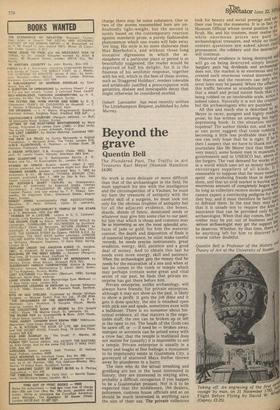Beyond the grave
Quentin Bell
The Plundered Past, The Traffic in Art Treasures Karl Meyer (Hamish Hamilton £4.00) No work is more delicate or more difficult than that of the archaeologist in the field, He must approach his site with the intelligence and the circumspection of a Vauban; he must lay bare the treasures of antiquity with the careful skill of a surgeon, he must look not only for the obvious trophies of antiquity but for all the adjacent evidence, the bones, shards, shreds of fabric, dessicated seeds or whatever may give him some clue to our past; for him that which is cheap and common may be as interesting as are the most splendid arte-: facts of jade or gold; for him the material context, the depth and disposition of finds is of essential importance; he must make careful records, he needs precise instruments, great erudition, energy, skill, patience and a good deal of money. And to obtain this last he needs even more energy, skill and patience. When the archaeologist gets the money that he needs for the excavation of a site and when at last he comes to the tomb or temple which may perhaps contain some great and vital secret of our past, he finds that private enterprise has got there before him.
Private enterprise, unlike archaeology, will always have friends; for private enterprise, although it may not show us the past, is likely to show a profit. It gets the job done and it gets it done quickly, the site is smashed open with pick axe and spade, sometimes even with a bulldozer. There is no nonsense about historical evidence, all that matters is the negotiable stuff, the rest can be broken up or left in the open to rot. The heads of the Gods can be sawn off, or — if need be — broken away, metopes or acroteria can be prised away with a crow bar; that the temple is mutilated does not matter for (usually) it is impossible to sell a temple. Private enterprise is usually in a hurry and laughs at fine feelings; a monument to its impetuosity exists in Guatemala City, a graveyard of shattered Maya Stellae thrown away by plunderers in a hurry.
The men who do the actual smashing and grabbing are not in the least interested in history; they are interested in staying alive, probably a difficult occupation if you happen to be a Guatemalan peasant. Nor is it to be expected that the middlemen, the dealers, policemen, customs house officials and so on should be much interested in anything save the size of their cut. The private collectors
look for beauty and social prestige and take their cue from the museums. It is in fact the Museum Official whose moral position is dif• ficult. He, and his trustees, must realise that while enormous prices are paid f°r archaeological treasures, and while no WO venient questions are asked about their provenance, the robbery and the destruction will continue. Historical evidence is being destroyed and will go on being destroyed simply because burglary pays big dividends and archaeologr does not, the market is so enormous and hes created such enormous vested interests that the thieves and the receivers can defy Whdi tever laws may be passed. When the effects °t this traffic become so scandalously aPPneer!,c that a small and proud nation finds that it !" being robbed on an intolerable scale, action indeed taken. Naturally it is not the criminn'' but the archaeologists who are punished. r All this and much else is described bY Meyer in racey, pungent and highly readah'" prose; he has written an amusing but highl depressing book. Is the situation entirelYs hopeless? The author thinks not, and he doe> at one point suggest that tomb robbing 1, becoming a little less profitable than it Was' one can only hope that he is right. If he 1.5' then I suspect that we have to thank not on'Y. journalists like Mr Meyer (not that there very many), some honest men in museunisl, governments and in UNESCO but, above,d4 the forgers. The vast demand for works ula„' in a world which uses art as money naturat!Ys encourages suppliers of all kinds. It ;s reasonable to suppose that far more moneY'd spent on producing frauds than in detectil them, and that an avid market is buying t11),.ak, enormous amount of completely bogus Wa'e So long as collectors receive stolen goods the4 cannot expect a convincing pedigree for iv°, they buy, and it must therefore be fairly ears.70 to defraud them. In the end they may that it is unsafe not to require the kirlu,e Assurance that can be provided only bY t"b archaeologist. When that day comes, the toll2e robber may be put out of business and serious archaeologist may get the support t711 he deserves. Whether, by that time, there yid be anything left for him to discover is course rather doubtful.
Quentin Bell is Professor of the History a
Theory of Art at the University of SusseX.


































 Previous page
Previous page